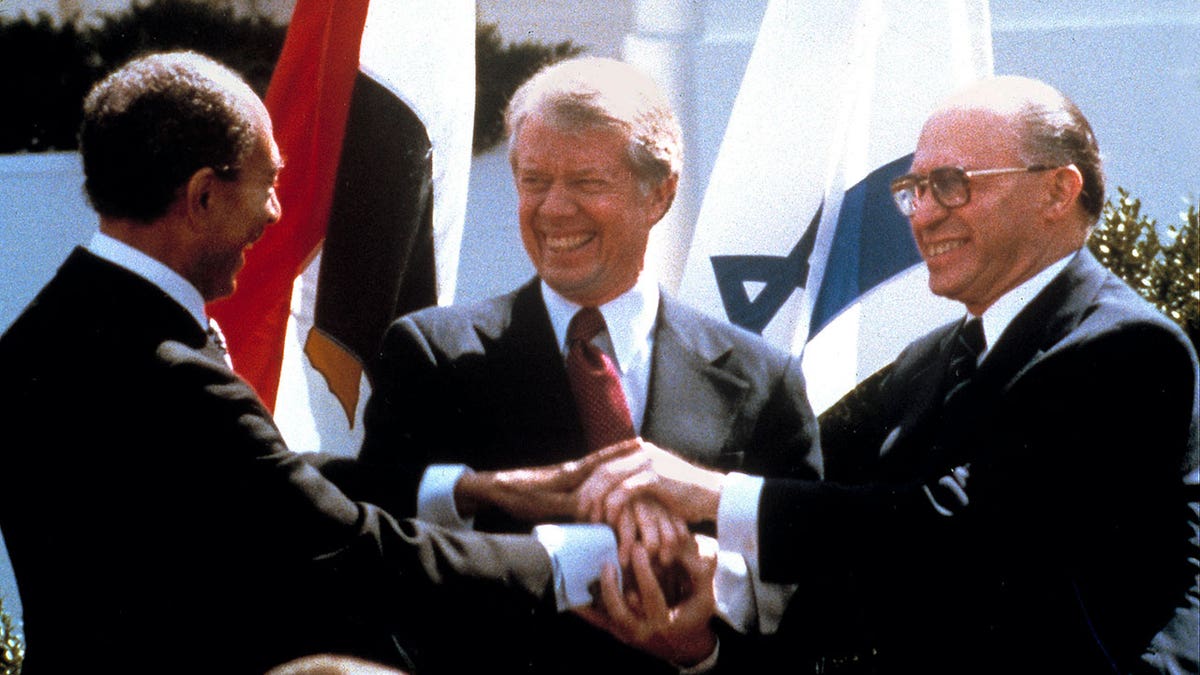- Egypt has threatened to cancel a decades-old peace agreement with Israel if Israel launches a large-scale attack on Rafah.
- About 1.4 million Palestinians are sheltered in crowded tent camps in Rafah, on the border with Egypt.
- If the deal is scrapped, it could have significant ramifications for Israel, which depends on stability along its southern border.
It was a warm handshake between unlikely politicians, conducted under the beaming gaze of President Jimmy Carter. Sunlight streams through the trees at Camp David, Maryland, as its President Anwar Sadat and Israeli Prime Minister Menachem Begin seal a historic accord that has allowed more than 40 years of peace. Among Israel and Egypt.
It has served as an important source of stability in an unstable region.
This peace has been established through two Palestinian uprisings. A series of wars between Israel and Hamas But now, with Prime Minister Benjamin Netanyahu vowing to send Israeli troops into the Gaza city of Rafah on the Egyptian border, the this government is threatening to scrap the deal.
Egypt strengthens its border with Gaza as Israeli attacks continue
Here’s a look at the history of the deal and what could happen if it’s revoked.

Egyptian President Anwar Sadat, left, U.S. President Jimmy Carter, center, and Israeli Prime Minister Menachem Begin shake hands outside the White House after signing a peace treaty between Egypt and Israel on March 26, 1979. A long-term peace deal with Israel if Israel launches a full-scale attack on Rafah, where some 1.4 million Palestinians are sheltering in densely packed tent camps on the Egyptian border. (AP Photo/Bob Dougherty, File)
How did the deal begin?
It was 1977, and Israel’s new prime minister, Begin, opposed giving away any of the land Israel had conquered in the 1967 Middle East war a decade earlier. These lands included the Sinai Peninsula of Egypt.
Egypt and Israel have fought four major wars, most recently in 1973. So it shocked the world when Egypt’s Sadat broke with other Arab leaders and decided to engage with the Israelis.
These negotiations culminated in the Camp David Accords in September 1978 and a peace agreement the following year.
Under the peace agreement, Israel agreed to withdraw from the Sinai, which Egypt would demilitarize. Israeli ships were allowed to pass through the Suez Canal, an important trade route. These countries established full diplomatic relations in Israel’s first peace treaty with an Arab country.
“The Camp David Accords were led by three brave men who took a bold stand because they knew the lasting impact of peace and security, now and for the future. That’s the kind of leadership we need today, and Time is lacking.” said Paige Alexander, chief executive of the Carter Center.
What is the current position of Egypt?
Two Egyptian officials and a Western diplomat told The Associated Press on Sunday that Egypt could suspend the peace deal if the Israeli army attacks Rafah.
Netanyahu says Rafah is the last remaining stronghold of Hamas after more than four months of fighting and sending ground troops is essential to defeating the group.
But Egypt opposes any move that could send disaffected Palestinians across the border into its homeland. Rafah also serves as the main entry point for humanitarian aid to the besieged region, and an Israeli attack could disrupt the delivery of vital supplies.
Rafah’s population has grown from 280,000 to an estimated 1.4 million as Palestinians flee elsewhere amid fighting in Gaza. Millions of these evacuees are living in sprawling tent camps.
Netanyahu has ordered the military to prepare a plan to evacuate all Palestinian civilians before the offensive begins. But it is not clear where they will go.
Netanyahu said on Sunday that he would be able to return to open spaces in the north. But these areas have been badly damaged by Israeli aggression.
What if the contract is void?
The agreement severely limits the number of troops on either side of the border, although countries have agreed in the past to modify these arrangements in response to specific security threats. This allows Israel to focus its military on other threats.
Blaine lands in Egypt to mediate Israel-Hamas deal
Along with the war in Gaza, Israel is engaged in near-daily clashes with the Hezbollah militant group in Lebanon. His protection A heavy contingent of forces is deployed in the occupied West Bank.
If Egypt cancels the deal, it could mean Israel can no longer rely on its southern border as an oasis of calm. Building up forces along its border with Egypt will undoubtedly challenge an already depleted Israeli army.
But it will also have serious implications for Egypt. Since the peace accord, Egypt has received billions of dollars in military aid from the United States.
This funding could be jeopardized if the contract is voided. The massive military build-up will also put pressure on Egypt’s already struggling economy.
Any move that could draw Egypt into hostilities “would be disastrous for the entire region,” Alexander said.